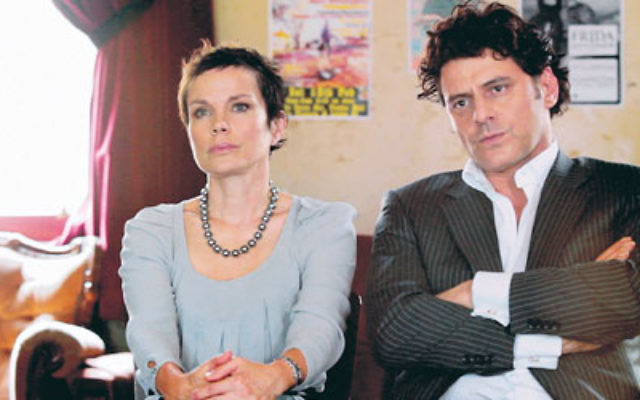Breaking down the barriers, face to face
LEADING Australian playwright David Williamson has written a timely and provocative screenplay about anger management and workplace conflict in Michael Rymer’s latest film, Face to Face.
Rymer grew up in Melbourne but trained as a filmmaker at the University of California. He is best known for Angel Baby, which won a slew of AFI awards in 1995, including Best Film. He returned to the US in 1997 where he directed Allie and Me and Perfume.
Rymer made Queen of the Damned for Warner Bros in Melbourne in 2002, then in 2003 moved back to the US where he was intimately involved in direction and production of the immensely popular sci-fi miniseries, Battlestar Galactica.
Face to Face marks a welcome return for Rymer to making films set in Australia, which reflect the director’s trademark compassion and involvement with contemporary themes.
It was filmed upstairs in a capacious conference room at Melbourne’s Trades Hall building in Carlton and the cast is led by acclaimed Australian actors Sigrid Thornton and Vince Colosimo.
Luke Ford (The Black Balloon, Kokoda, Animal Kingdom) plays Wayne, a young, out-of-control construction worker who, angry at being sacked, smashes his car into the back of his boss’s silver Jaguar.
In the hope that the conflict can be resolved out of court, Wayne is given the opportunity to explain his actions at a community conference mediated by Jack (Matthew Newton), and attended by the people most affected by Wayne’s behaviour.
These include his aggrieved boss Greg (Colosimo), Greg’s long-suffering wife Claire (Thornton), Wayne’s mother Maureen (Lauren Clair), his best friend Barry (Josh Saks), and four puzzled co-workers.
A trained facilitator, Jack hopes that by asking carefully targeted questions of Wayne and the others, a solution can be found to resolving the conflict and managing Wayne’s anger. However, much like unpacking a nest of Babushka dolls to discover the baby inside, what unfolds are disclosures that are at once heartbreaking, shocking and hilarious.
Why did Rymer return to Australia to direct and script such a low-key, low-budget film as Face to Face?
Newton’s character Jack is modelled on David Moore, a facilitator and trainer in conflict management, who has been a key figure in reforms in education and justice systems in Australia and overseas. Face to Face is based on transcripts from actual conflict-resolution sessions conducted by Moore, who champions community conferencing as a means for ‘restorative justice’.
“David Moore and I are old friends,” Rymer explains at a packed advance screening of Face to Face last week. “We’ve known each other a long time. We were having lunch one day and I asked him what he was up to. ‘I can’t tell you,’ he replied, ‘but David Williamson has written a play about it!’ He emailed me the play, and I read it.
“I’m very proud of the film because it’s what I imagined when I first read the play. At first, I didn’t know whether I’d be interested in these people. Ten pages in and I was hooked. Halfway through I was surprised and entertained, and by the end I had a little cry, had a laugh and thought, ‘Wow! This is actually something that can change the world.’”
Rymer’s belief in Williamson’s play and the efficacy of transformative
justice is echoed by childhood friend Nick Orloff, whose confidence in both the project and Rymer’s gift for filmmaking led to him becoming one of Face to Face’s four executive producers.
“I decided not to wait for someone to give me permission to make a film, but put it together myself,” says Rymer. “I called Nick for advice and it turned out he was the key to the film working, because he not only came in as an investor, but basically ran it.
“We grew up together. We’ve known each other since we were two, and we also went to Sunday school at Temple Beth Israel every Sunday of our [young] lives.”
Rymer’s friend Thornton, who plays Claire, believes that Face to Face, with its theme of peaceful reconciliation, is in tune with the zeitgeist, and reflects the mood of the planet.
Does Rymer think that his strong attraction to the social justice theme in Williamson’s play has been triggered in part by his early religious education, with its emphasis on the rabbinic precept of tikkun olam?
Rymer’s response is considered and forceful. “I grew up in a humanist tradition surrounded by intellectually oriented family members. We live in a time where entertainment is very de-personalised. It’s about violence and titillation. It’s about eye candy and special effects,” he said.
“It’s a part of my being Jewish to present stories about human beings trying to connect, and failing to connect, [then] learning how to connect. Learning to communicate is as much a fundamental principle of Judaism to me as anything else.
“When David showed me the play I said, ‘Geez, you’ve just figured out a way to solve half the world’s problems!’ This tells me that the fundamental step in the process of making peace is that the people involved have to want to end conflict.”
While independent filmmakers battle the Hollywood behemoth in marketing their films, Rymer hopes that the entertainment value of Face to Face and the importance of its message will be enough to encourage audiences to see it.
Face to Face is currently screening in cinemas.
REPORT by Jan Epstein
PHOTO: Sigrid Thornton (left) and Vince Colosimo star in Face to Face.


comments